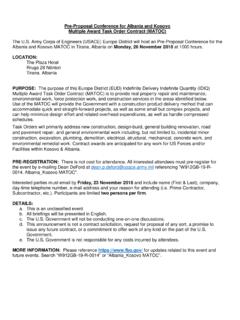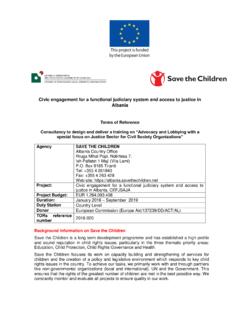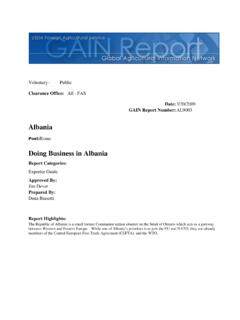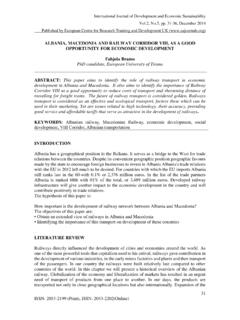Transcription of MIGRATING SOARING BIRDS IN DIVJAKË-KARAVASTA …
1 This project is supported by MIGRATING SOARING BIRDS IN DIVJAK -KARAVASTA NATAIONAL PARK IN albania (Activity report) Clanga clanga in Divjake Karavasta National Park, Aidan Place Center for the Protection and Preservation of Natural Environment in albania Autumn 2018 This project is supported by AUTUMN MIGRATION OF SOARING BIRDS IN DIVJAK -KARAVASTA NATAIONAL PARK IN albania (Activity report) Authors of the report: Mirjan Topi1, Zydjon Vorpsi1, Biljana Topic2, Sabina ano1, Kliton Hysollari1, Xhemal Xherri1, Klea Duro1, Endora elohoxhaj1, Marija Soskic3, Bojan Zenkovic3, Ksenia Medvenica3, Dejan Angelov4, Dushica Zaova4, Stefani Iljoska4 & Goran Topic2. 1 Center for the Protection and Preservation of Natural Environment in albania (PPNEA) 2 Ornithological Society Nase Ptice 3 Center for Protection and Research on BIRDS (CZIP) 4 Macedonian Ecological Society (MES) Recommended citation: , , , , , , , , Soski.
2 M, , , , , & (2018) Autumn Migration of SOARING BIRDS in Divjak -Karavasta National Park in albania . Activity Report under the project BIRDS Without Borders supported by the Western Balkans Fund (WBF). Center for the Protection and Preservation of Natural Environment in albania Autumn 2018 This project is supported by 1. Table of contents 1. Summary .. 4 2. Information about the project .. 5 3. Introduction .. 6 4. 6 Information about the site .. 6 Bird Migration Counts .. 7 Period of the study .. 7 Counting technique .. 7 5. Results and discussion .. 8 6. References .. 10 7. Appendixes .. 11 This project is supported by 1. Summary This report describes the fourth and the last camp within BIRDS Without Borders project.
3 The aim of the activity was to carry out for the first time ever a dedicated monitoring for the MIGRATING SOARING BIRDS in Divjak - Karavasta National Park and raise the capacities of the participants on carrying out such activity. The activity has been implemented along 1st to 5th of October 2018. A total number of 102 individuals from 9 raptor species have been counted. The most common species resulted to be the Marsh Harrier (Circus aeruginosis) with 38 individuals. The 2nd most common species was the Common Buzzard (Buteo buteo) with 26 individuals, followed by the Osprey (Pandion haliaetos), the Hobby (Falco subbuteo) and the Sparrowhawk (Accipiter nisus) with 20, 10 and 4 individuals respectively. On the other hand the less common species are the Lesser Spotted Eagle (Clanga pomarina), the Pallid Harrier (Circus macrorus), the Red-footed Falcon (Falco vespertinus) and the Short-toed Eagle (Circaetos gallicus), all with 1 individual each.
4 Almost all the raptor species observed and counted, apart from the Red-footed Falcon and the Marsh Harrier, are part of the red list of the Albanian fauna, with 2 being Critically Endangered, 1 Endangered and 4 Vulnerable. At global level, most of the species are listed as Least Concern and only 2 species have the status Near Threatened. These findings confirm that Osprey is a much more common migrant along the Albanian coastline that it was found or thought to be. This project is supported by 2. Information about the project BIRDS Without Borders (BWB) project is enabled thanks to the support of the Western Balkans Fund (WBF) and it is implemented by four environmental NGOs from four different Balkan countries such as albania (Center for the Protection and Preservation of Natural Environment in albania PPNEA), Bosnia and Herzegovina (Ornithological Society Nase Ptice), Macedonia (Macedonian Ecological Society) and Montenegro (Center for Protection and Research on BIRDS CZIP).
5 This project expresses not-tied-country borders nature of the bird species migration and need for joint interventions in order to contribute to the preservation of birdlife diversity in the Adriatic Flyway migration route. This project aims to empower and strengthen cross-border cooperation of environmental civil society organization in the Western Balkans. The activities of the project consisted in organizing four joint camps, one in each of the above mentioned countries for the involvement of young people, especially biology students and the aim is to strengthen the capacities of participants related to the protection and monitoring of bird species through research and monitoring camps and ringing activities. Therefore, project partners invite biology students and NGO members to participate at the camps. For more information about the project, please visit the link bellow and/or contact the coordinating beneficiary: This project is supported by 3.
6 Introduction This report describes the fourth and the last camp within BIRDS Without Borders project. The aim of the activity was to carry out for the first time ever a dedicated monitoring for the MIGRATING SOARING BIRDS in Divjak - Karavasta National Park and raise the capacities of the participants on carrying out such activity. The activity has been implemented along 1st to 5th of October 2018. 4. Methodology Information about the site Divjak - Karavasta National Park (Albanian: Parku Komb tar Divjak -Karavasta) is situated in western albania , sprawling across the Myzeqe Plains in the direct proximity to the Adriatic Sea. The park spans a territory of square kilometres (22,230 ha) containing remarkable features such as wetlands, salt marshes, coastal meadows, floodplains, woodlands, reed beds, forests and estuaries. Because of the park's important and great availability of bird and plant species, it has been identified as an important Bird and Plant Area of international importance.
7 Among the largest in the Mediterranean Sea, the lagoon of Karavasta has been recognised as a wetland of international importance by designation under the Ramsar Convention. It is separated from the Adriatic Sea by a large strip of sand and was formed by the sediments of which has been discharged by Shkumbin and Seman. Located near the sea, the park experiences mediterranean climate, with temperatures that ranges between 12 C (54 F) in February and 24 C (75 F) in August. The particular climate has favored the development of a vast array of floral and faunal species with an immense quality. In terms of biogeography, it falls entirely within the Illyrian deciduous forests terrestrial ecoregion of the Palearctic Mediterranean forests, woodlands, and scrub. The wealth of fauna is reflected in the list of many species and subspecies recorded to date, with 228 species of BIRDS , 25 species of mammals, 29 species of reptiles and 29 species of amphibia.
8 The park is mostly notable for featuring 5% of the world population of the globally endangered and extremely rare Dalmatian pelican. The wetlands and swamps are abundant in algaes and dense phanerogam grasses. The forests and woodlands are ascertained by a mixture of varied species of deciduous, coniferous and mixed trees, due to the lower river valleys and sea coast. The This project is supported by forests are important because they provide shelter for a large number of animals, including the red fox, golden jackal and roe deer. The park provides important spawning and nursery habitat for economically valuable fish species that are exploited by a local fisheries cooperative. It is also known for the beauty of its natural landscape, its role in the local economy and its touristic appeal. This park offers a wide range of diverse wildlife to the explorers.
9 Bird Migration Counts Period of the study The fieldwork was conducted from 1st to 5th of October 2018. The first day was the arrival of participants and the last day (the 5th) the departure. Counting technique The fieldwork was realized following a standard methodology (MICHEV et al. 2011, 2012). One observation point has been defined (please see the map bellow- 40 59' "N ; 19 28' "E) and the counts have been carried out only from this point. BIRDS were count along 2nd, 3rd and 4th of October. The count started from 08:30 and ended in 18:00 (apart from the first day due to weather conditions the count ended at 14:00). Observations were made using binoculars (min 8x and 10x) and telescopes (min 20x). All the participants were involved in scanning the sky for raptors and once spotting a bird the most experienced ones were involved for the identification. The data were noted using the NaturaList application for Android and SmartBirds Pro application for Android systems.
10 This project is supported by Fig 1. Map of Divjak -Karavasta National Park and the observation point given in red star. 5. Results and discussion A total number of 104 individuals from 10 raptor species have been counted. The most common species resulted to be the Marsh Harrier (Circus aeruginosis) with 38 individuals. The 2nd most common species was the Common Buzzard (Buteo buteo) with 26 individuals, followed by the Osprey (Pandion haliaetos) and the Hobby (Falco subbuteo) with 20 and 10 individuals respectively. On the other hand the less common species are the Lesser Spotted Eagle (Clanga pomarina), the Pallid Harrier (Circus macrorus), the Red-footed Falcon (Falco vespertinus) and the Short-toed Eagle (Circaetos gallicus), all with 1 individual each and the Long-legged Buzzard (Buteo rufinus) with 2 individuals (please see the chart below).









